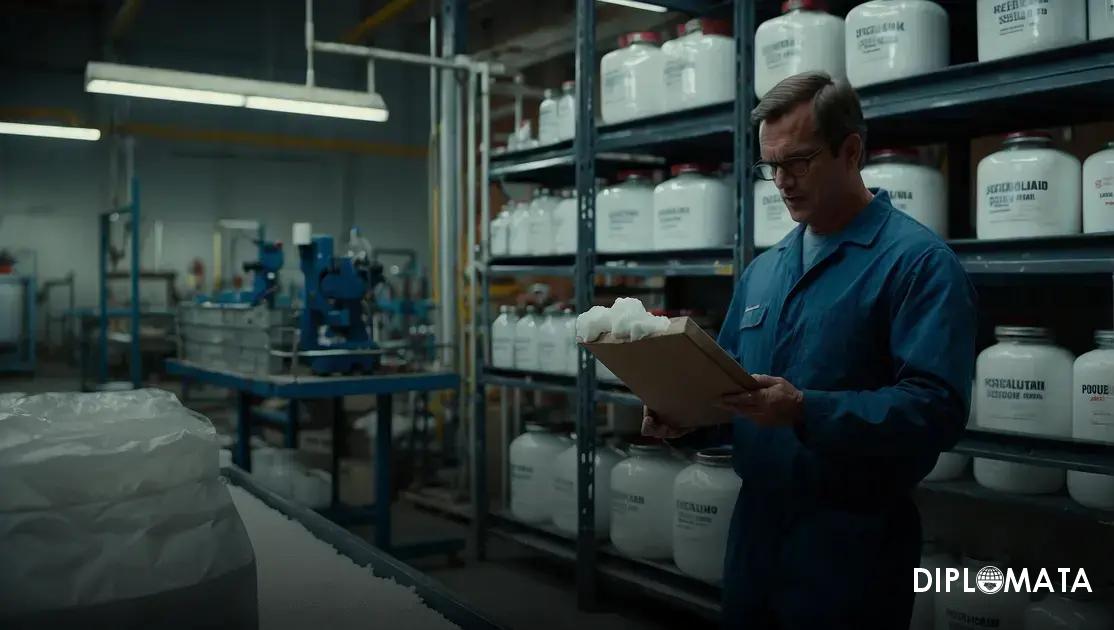In today’s dynamic chemical and oleoquímico landscape, sourcing reliable palm fatty acids requires more than a simple price check.
It demands a strategic approach that aligns quality, supply continuity, and global reach with your specific production needs.
Brazil has emerged as a pivotal hub for palm-based derivatives, driven by its integrated refining capacity, robust logistics network, and a growing portfolio of oleochemical solutions.
For companies navigating HPPC, pharma, industrial chemicals, and animal nutrition, selecting the right partner means more than a transaction—it means a lasting relationship that scales with demand, quality expectations, and regulatory standards.
This guide presents a practical, human-centered framework to identify and engage top palm fatty acid suppliers in Brazil, weaving real-world insights from two decades of market experience.
Throughout, you’ll notice how Palms Fatty Acids sourcing in Brazil is built on credibility, traceability, and performance.
And you’ll see how Diplomata Comercial translates these principles into tangible value for your business strategy and bottom line.
Palm Fatty Acid Suppliers in Brazil: The Ultimate Bulk Sourcing Guide
Market Overview: Brazil as a Palm Fatty Acid Landscape
Brazil’s position in the palm fatty acid ecosystem stems from a mature oleochemical sector, integrated supply chains, and a history of partnering with global industries.
For buyers, the landscape translates into predictable lead times, scalable production runs, and a spectrum of refining and packaging options.
The strength lies in the ability to move from bulk orders to steady, long-term supply agreements that support continuous production lines across HPPC, agrochemicals, and food-grade applications.
In practice, the most effective partnerships rely on quality control, traceability, and logistics integration.
When evaluating suppliers, look for labs and QA processes that align with your target specifications, whether you’re seeking high purity grades or specific impurity thresholds.
The Brazilian market rewards suppliers who can demonstrate end-to-end control—from raw material sourcing through finished product release.
This emphasis on process maturity helps reduce variability and strengthens supply confidence for customers with tight production windows.
From a strategic perspective, partnering with an experienced distributor who combines regional knowledge with global reach adds a layer of resilience.
Diplomata Comercial, with more than twenty years in the chemical and oleochemical space, exemplifies this model.
The company’s footprint extends beyond national boundaries, delivering not only materials but also the confidence that comes with a reliable, scalable supply chain.
In a sector where volatility can ripple across weeks of production, a solid partner’s value becomes measurable in uptime, quality consistency, and sustainable cost management.
How Diplomata Delivers with Global Reach
Choosing a supplier is about more than product specs; it’s about service scope, global logistics, and quality assurance.
Diplomata Comercial positions itself as a strategic ally for manufacturers seeking consistent bulk sourcing of palm fatty acids and related oleochemicals.
The company’s long-standing relationships with international producers enable access to a broad spectrum of grades, packaging formats, and logistical solutions tailored to your capacity and lead-time requirements.
What sets this approach apart is the combination of technical proficiency and practical execution.
Clients benefit from direct access to specialists who understand the needs of chemical, pharmaceutical, and nutritional segments.
The result is a streamlined experience: precise formulation support, clear documentation, and a shipment cadence designed to minimize disruption.
In a market where supplier reliability is as critical as the price, this holistic capability transforms a commodity purchase into a strategic asset for production planning and cost optimization.
How to Evaluate Palm Fatty Acid Supply Partners in Brazil
Quality, Certifications, and Compliance
When evaluating potential partners, begin with the certifications and quality systems that govern their operations.
Look for documented QA processes, batch traceability, and third-party testing results that align with your product requirements.
For palm fatty acids, you’ll want to verify impurity profiles, fatty acid composition, moisture control, and acid values appropriate to your end-use application.
A supplier with robust QA capabilities reduces the risk of deviations that could affect formulations, stability, or regulatory compliance across markets.
Beyond certificates, pay attention to the organization’s sustainability commitments, ethics, and supplier audits.
Companies that invest in responsible sourcing and transparent supply chains typically demonstrate stronger risk management in times of market stress.
Diplomata Comercial translates these principles into practical outcomes: traceable sourcing, controlled production environments, and aligned documentation packages that support your regulatory and quality expectations.
In practice, a credible partner will provide accessible documentation, including specifications sheets, COAs, and sample testing results.
They will also offer ongoing QA updates and proactive communication when any deviation or change in material status occurs.
This level of transparency is essential for building trust and ensuring your production remains uninterrupted.
Traceability, Reliability, and After-Sales Support
Traceability is the backbone of a dependable palm fatty acid supply.
A strong partner can map material origin, processing steps, and lot-specific data from intake to outbound shipment.
Reliability goes hand in hand with supply continuity, capacity to meet peak demand, and an ability to absorb shifts in market conditions without compromising delivery timelines.
After-sales support, including technical assistance, documentation updates, and issue resolution, differentiates excellent suppliers from good ones.
From the client perspective, this translates into predictable delivery schedules, clear escalation paths, and proactive risk management.
Diplomata Comercial integrates these elements into every engagement, offering a coordinated approach to documentation, sample testing, and product stewardship that aligns with your internal quality systems.
The outcome is a partnership that you can rely on not just for today’s orders, but for long-term production planning and expansion into new product lines.
Logistics, Storage, and Handling for Palm Fatty Acids in Brazil
Shipping Modes, Incoterms, and Scheduling
Bulk shipments of palm fatty acids require careful consideration of shipping modes and Incoterms.
The right arrangement balances cost, control, and risk, ensuring your receiving site can handle the material safely and compliantly.
Early alignment on terms like CIF, FOB, or DDP, depending on your procurement model and destination country, helps avoid late-stage surprises and last-minute price fluctuations.
A trusted partner will offer transparent lead times, production calendars, and routing options to fit your plant’s production plan and storage capacity.
Efficient scheduling also depends on pre-clearance documentation, customs readiness, and cargo insurance.
With Brazil’s logistics network, choosing the right port, carrier, and consolidation strategy can significantly impact total landed cost and on-time delivery.
Diplomata Comercial helps clients navigate these complexities by providing tailored logistics plans, real-time status updates, and port-to-plant visibility that supports lean manufacturing and just-in-time inventory practices.
Packaging, Storage, and Safety Best Practices
Proper packaging and storage are essential to preserve palm fatty acids’ quality and stability.
Depending on the grade and intended use, options include bulk drums, totes, or ISO containers.
Temperature control, moisture protection, and corrosion resistance are key considerations, along with compatible liners and compatibility with downstream processing equipment.
A thoughtful handling strategy minimizes oxidation, color changes, or impurities that can affect performance in end products.
From a safety perspective, clear labeling, MSDS availability, and appropriate handling instructions are non-negotiable.
Your supplier should provide comprehensive documentation and support to ensure your facility complies with local and international transport and storage regulations.
Diplomata Comercial emphasizes practical guidance and proactive support, enabling clients to plan storage logistics, set up inbound receiving processes, and implement quality checks upon receipt.
Real-World Success: Illustrative Case Studies in Palm Fatty Acid Sourcing
Illustrative Case: HPPC Manufacturer Continuity
In a representative scenario, an HPPC-focused producer sought a stable palm fatty acid supply to maintain a consistent formulation line.
The partner delivered a program that combined reliable supply with rigorous QA and traceability.
The result was smoother production scheduling, fewer batch-at-risk events, and clearer documentation for regulatory approvals.
The collaboration also provided ongoing testing data and formulation guidance that supported product stability and performance across batches.
The approach highlighted the importance of collaboration, documentation quality, and quality assurance as ongoing differentiators in a volatile market.
By aligning technical teams and logistics operations, both sides built a framework that could adapt to demand shifts while maintaining product integrity and regulatory compliance.
Diplomata Commercial’s role as a coordinating partner was central to achieving this level of continuity.
Illustrative Case: Animal Nutrition and Nutraceutical Supplier Resilience
A second illustrative case involved an animal nutrition company seeking a dependable palm fatty acid supply to meet formulation standards and seasonal demand.
The engagement emphasized flexible contract structures, prioritized safety data, and robust traceability.
With a strategy built around repeatable processes and proactive risk management, the client experienced steadier production planning, better raw material availability, and improved inventory turns—even when market dynamics fluctuated.
Key takeaways from this scenario include the value of flexible contracts, risk planning, and supplier alignment.
The partnership demonstrated how a well-structured procurement program can turn a commodity into a strategic advantage, supporting product consistency, customer trust, and long-term growth objectives.
7 Practical Steps to Start Sourcing Palm Fatty Acid in Brazil Today
Practical Steps to Start Sourcing Palm Fatty Acid
-
Define your technical requirements clearly, including grade, FFA targets, acid values, moisture levels, and any required certifications.
Precise specs save time and narrow the field to truly capable partners.
-
Assess supplier capabilities for traceability and documentation quality.
Request COAs, MSDS, and batch-level data to ensure alignment with your QA program.
-
Shortlist candidates with proven logistics reliability and a track record of steady delivery.
A global reach can be a decisive advantage for multi-site manufacturing teams.
-
Request samples and conduct in-house testing or third-party lab verification.
Use batch-specific testing to validate performance before large-scale adoption.
-
Negotiate terms with a focus on Incoterms, payment terms, and lead-time commitments.
Structure that supports your production planning and cash flow needs.
-
Develop a risk mitigation plan that covers supply interruptions, price volatility, and regulatory changes.
A proactive stance minimizes disruption and protects your margins.
-
Run a controlled pilot order to validate the end-to-end process—from order placement and product release to storage, handling, and downstream usage in formulations.
Strategic Next Steps for Palm Fatty Acid Sourcing in Brazil
With a clear view of market dynamics, supplier evaluation criteria, and practical sourcing steps, you’re positioned to elevate your palm fatty acid procurement.
A partner who embodies long-standing technical depth, global reach, and a commitment to transparent collaboration translates into tangible advantages: steady supply, consistent quality, and optimized total cost of ownership.
If you’re ready to translate these insights into action, engage with Diplomata Comercial’s team of specialists.
They bring two decades of hands-on experience across HPPC, pharma, and nutrition segments, delivering tailored sourcing programs that align with both your technical requirements and business objectives.
Let’s discuss how to configure your palm fatty acid supply for reliability, scalability, and sustained competitive advantage.
Contact Diplomata Comercial today to start designing a palm fatty acid sourcing program that fits your needs, timelines, and regulatory landscape. Reach out for a no-obligation consultation and discover how a strategic partnership can elevate your procurement strategy, streamline operations, and reinforce your market position.
Frequently Asked Questions
What makes Brazil a strategic hub for palm fatty acid suppliers?
Brazil’s mature oleochemical sector, integrated refining capacity, and robust logistics enable predictable lead times and scalable production. The ecosystem supports bulk sourcing across HPPC, pharma, and animal nutrition with diverse refining and packaging options. This combination positions Brazil as a strong partner for long-term palm fatty acid supply.
How do I evaluate quality and traceability when sourcing palm fatty acids from Brazil?
Start by reviewing the supplier’s QA program, accredited labs, and end-to-end traceability data. Request certificates of analysis, batch records, and a supplier quality manual to verify consistency. Ensure their specs align with your target use and regulatory requirements.
What are typical lead times and capacity options for bulk orders?
Brazil’s integrated refining and logistics networks typically yield predictable lead times and scalable capacities for bulk orders. Many suppliers offer bulk quantities and long-term contracts to support continuous production lines. Always confirm current capacity, MOQs, and any seasonal variations.
What regulatory considerations should buyers know when sourcing palm fatty acids in Brazil?
Regulatory requirements vary by application (e.g., HPPC, pharma, food-grade). Ensure compliance with Brazilian regulations, import rules, and relevant international standards. Work with suppliers who can provide compliance documentation and product registrations when needed.
How can you ensure supply continuity for HPPC, pharma, and animal nutrition applications?
Develop relationships with multiple suppliers or flexible partners and pursue long-term contracts with clear service levels. Emphasize traceability, consistent quality, and integrated logistics. Regular performance reviews and contingency plans help minimize disruption.
What packaging and logistics options are common for palm fatty acids in Brazil?
Common packaging includes bulk tanker shipments, drums, and IBCs depending on volume and use-case. Strong logistics networks with port and inland transportation support dependable delivery timelines. Choose packaging that minimizes contamination risk and fits your storage capabilities.
How does price volatility affect long-term contracts with Brazilian suppliers?
Long-term agreements with indexed or hybrid pricing can mitigate short-term swings while preserving supplier competitiveness. These structures offer budget predictability for planning and production. Consider total cost of ownership beyond the unit price.
How can a buyer establish a successful long-term partnership with a palm fatty acid supplier in Brazil?
Begin with clear specifications, transparent QA, and a shared collaboration roadmap. Prioritize traceability, reliable logistics, and responsive support to build trust. Conduct regular audits and performance reviews to sustain growth as demand evolves.





